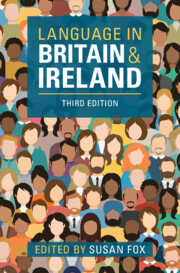Book contents
- Language in Britain and Ireland
- Language in Britain and Ireland
- Copyright page
- Contents
- Figures
- Tables
- Contributors
- Acknowledgements
- Map of Britain and Ireland
- Introduction
- Part I English
- Part II Multilingualism in Britain and Ireland: The Celtic Languages
- Part III Multilingualism in Britain and Ireland: Minority Languages
- Part IV Multilingualism: The Development of Urban Contact Varieties
- Part V Applied Sociolinguistic Issues
- 24 Language Policy and Planning in Britain and Ireland
- 25 ‘Non-standard’ English and Education
- 26 Education, England and Users of Languages Other than English
- Index
- References
25 - ‘Non-standard’ English and Education
from Part V - Applied Sociolinguistic Issues
Published online by Cambridge University Press: 17 October 2024
- Language in Britain and Ireland
- Language in Britain and Ireland
- Copyright page
- Contents
- Figures
- Tables
- Contributors
- Acknowledgements
- Map of Britain and Ireland
- Introduction
- Part I English
- Part II Multilingualism in Britain and Ireland: The Celtic Languages
- Part III Multilingualism in Britain and Ireland: Minority Languages
- Part IV Multilingualism: The Development of Urban Contact Varieties
- Part V Applied Sociolinguistic Issues
- 24 Language Policy and Planning in Britain and Ireland
- 25 ‘Non-standard’ English and Education
- 26 Education, England and Users of Languages Other than English
- Index
- References
Summary
This chapter reviews the long-standing debate on ‘standard’ and ‘non-standard English’ in education, highlighting differences in approach not just between policymakers and professional linguists but also within the academic community. It introduces a language ideological framework that treats ‘standard’ and ‘non-standard’ English as social constructions rather than linguistic fact, and presents research evidence to debunk common myths about ‘non-standard’ English that circulate in education (for example, that ‘non-standard’ speech will impede progress towards fully-fledged literacy). The chapter ends with reflections on the role sociolinguists have played in educational debates, with suggestions for future work. Ultimately, the chapter makes the case that sociolinguists should adopt a critical, language ideological approach in order to expose and challenge the hierarchies and educational inequalities reproduced through standard language ideology.
Keywords
- Type
- Chapter
- Information
- Language in Britain and Ireland , pp. 543 - 567Publisher: Cambridge University PressPrint publication year: 2024

